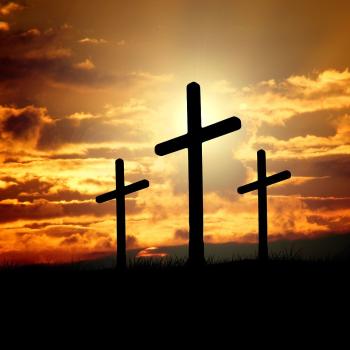
The Time of Noah
Last time we looked at Adam and Eve (whether literal figures or an allegory of humankind’s relationship with God, the message is the same), and how judgement was the pivotal sin that brought about the Great Plummet of the human race. When we appropriated for ourselves the position of Judge – of ourselves, others and God – we laid claim to a platform that is the sole province of the Almighty. Only God is capable of judging, because only God knows the motives of the heart (1 Cor 4, 5):
‘Therefore judge nothing before the appointed time; wait until the Lord comes. He will bring to light what is hidden in darkness and will expose the motives of the heart.’
Instead of rebuking and punishing Adam and Eve, God slaughtered an animal and clothed their shame with the skins as a symbol of the coming Christ, whose sacrifice would cloak all of us in righteousness forever. He banished Adam and Eve from Eden as an act of mercy, as living forever in a broken, self-hating state would be Hell on Earth, but continued to walk with them and be their God.
This is entirely consistent with the nature of God as perceived by David. Psalm 145, 8-9:
‘The Lord is gracious and full of compassion,
Slow to anger and great in mercy.
The Lord is good to all,
And his tender mercies are over all his works.’
The Lord remained gracious to Adam and Eve, his heart full of compassion towards them. He did not treat them angrily, despite the mess they’d made of things, but instead, being minded of their fallen, broken state, he showed the greatness of his mercy. So If Adam and Eve did not become recipients of wrath, despite their pivotal role in cursing and diminishing the natural order they were responsible for, why then, in Noah’s time, did God respond to sin with a devastating flood? What was different? What had changed?
The answer is nothing. David’s description of God’s nature includes the fact that he does become angry – slowly, and always giving preference to mercy when it is sought, but God is not a passive, toothless benefactor, whose creations can behave destructively, and he won’t have feelings about it. If pushed to the limit, there is anger in God’s nature, because there is justice in God’s nature. I think it is safe to conclude then, that by the time of Noah, God’s anger had been fully kindled. The Bible doesn’t give us much detail on what was going on, but it does offer a helpful insight into the degradation of humankind at that time. Genesis 6, 5-6:
‘Then the Lord saw that the wickedness of man was great in the earth, and that every intent of the thoughts of his heart was only evil continually. And the Lord was sorry that He had made man on the earth, and He was grieved in His heart.’
As a young man, I had a rather two-dimensional approach to scripture, where all verses can be applied with equal import and immediacy, no matter their context. It never occurred to me to place this verse in the context of the story, but instead took it as a definitive description of the state of the human heart. This never sat comfortably, and despite my best efforts to bend my mind around such a judgement, I couldn’t make it fit. There was goodness all around me, in the lives of believers, unbelievers and people who followed other faiths alike.
These days I hold to an alternative interpretation; the verse describes what God perceived in the hearts of the human race prior to the flood. In other words, society was in a far worse state than it is today. No doubt the modern world is able to compete in microcosm, where people’s hearts have been calloused by war, terrorism, despotism and terrible poverty, but we’ve had millennia to build basic moral structures and laws to govern society, and that gives breathing room to the better parts of our nature. If I look at my friends today, whatever their beliefs, I see kind and generous people doing their best. That goodness doesn’t earn anyone the favour of God, but transparently, the inclinations of their hearts are not ‘only evil, all the time’.
The implicit question, then, is what the people of Noah’s time might have done to earn destruction from a merciful God, who is slow to anger. The Bible is not explicit in this, but it does offer us examples of other, more localised instances of the Lord’s wrath falling on an entire society. For the purposes of simplicity, I’ll use a single example – the city of Sodom, in Genesis 19.
Prior to the destruction of the city, the Lord visited Abraham in the form of an angel, and shared with him that he was going to judge Sodom, along with its sister city, Gomorrah (verse 20):
‘Because the outcry against Sodom and Gomorrah is great, and because their sin is very grave…’
The Lord’s visitation of Abraham seems to have a purpose – God wanted Abraham to intercede on behalf of the people of Sodom, giving him reason to suspend judgement. Abraham talks a willing God into an agreement – the Lord will only destroy the city if there are fewer than ten righteous people living within it. Again we see the Lord seeking to avoid judgment in favour of mercy. The city would not be destroyed unless it was totally and irredeemably given to evil. Sadly the city of Sodom couldn’t meet that mark, the only righteous folk within it being Lot (another of the patriarchs) and his family, who God intended to rescue from the coming judgement (chapter 19, 4-5):
‘Now before they lay down, the men of the city, the men of Sodom, both old and young, all the people from every quarter, surrounded the house. And they called to Lot and said to him, “Where are the men who came to you tonight? Bring them out to us that we may know them carnally.”’
This was the kind of environment Lot was living in – where men roamed the streets in packs, seeking to rape strangers. I want to be clear about this – the gay community has been smeared by association with Sodom – indeed, that’s where the word sodomy comes from. Surely the sin of Sodom was rape, regardless of the gender of the individuals who were the target of abuse. It is unthinkably clumsy and cruel, in my view, to associate Sodom with the homosexual community. I know plenty of gay couples whose fidelity and care toward each other has endured for decades – being around them is a joy. It makes me bristle when people link the loving, committed relationships my friends enjoy with a place like Sodom. What fellowship has fidelity with rape? The association doesn’t work.
Back to the text. So caught up in lust and violence were the men of Sodom, that they tried to force their way into Lot’s house, but the angels sent to rescue him protected him from harm. The Lord urged him to gather his family and get out of the city, because he was going to destroy it.
In Sodom, we are looking at a place so corrupt, so violent, selfish and lustful, so loveless, so utterly given to darkness, that all of its citizens with the exception of one family had to be killed. But even in God’s wrath, there is mercy – first, the negotiation with Abraham. God spoke with his friend, the one who trusted and believed him, and bound himself to limiting his wrath if at all possible. Secondly, the rescue of Lot’s family, which appears to be the principal reason for the visit to the city. Thirdly, the destruction of the city itself. Such lives are a living hell, and perilous to anyone coming into contact with them. Rather than let them spread their evil abroad, the Lord purged the Earth of Sodom’s irredeemable darkness. In such an extreme, death is a mercy.
Perhaps then, this helps us understand what it looks like for the human heart to be ‘only evil, all the time’. In Noah’s case, however, the rot had spread too broadly to contain. Just as he did with Lot, the Lord looked for the righteous left in the Earth and rescued them from destruction.
In the story of Noah, we see God in the moment of his anger, but that’s not the end for those killed in the flood. Even then, he was planning redemption. 1 Peter 3, 18-20:
For Christ also suffered once for sins, the righteous for the unrighteous, to bring you to God. He was put to death in the body but made alive in the Spirit. After being made alive, he went and made proclamation to the imprisoned spirits – to those who were disobedient long ago when God waited patiently in the days of Noah while the ark was being built.
This is crucial in understanding the heart of God towards those he judged. After Jesus had died, and before he rose again, he descended to Hades (the Old Testament concept of Hell) to preach to those whose hearts had been inclined toward evil, all the time, and liberated them from bondage. They had been on his mind ever since the flood. Eph 4, 8-10:
‘When He ascended on high,
He led captivity captive,
And gave gifts to men.”
(Now this, “He ascended”—what does it mean but that He also first descended into the lower parts of the earth? He who descended is also the One who ascended far above all the heavens, that He might fill all things.)’
This descent into Hades preceded Christ’s ascension to Heaven and assumption of his rightful position as Lord of All, and he took the captive spirits with him, leading captivity captive. Indeed, it is captivity itself that has been taken captive by Christ. He is never the one who binds us up; he always leads us out of restriction and into freedom.
We see in the story of Noah the emotion of God – his patience, his pleas, his eventual anger, his regret that he made us, and his deep resolve that the world would never again be judged by flood or disaster, even if humankind reverted to its destructive ways. Isaiah 54, 8-10:
‘With a little wrath I hid My face from you for a moment;
But with everlasting kindness I will have mercy on you,”
Says the Lord, your Redeemer.
“For this is like the waters of Noah to Me;
For as I have sworn
That the waters of Noah would no longer cover the earth,
So have I sworn
That I would not be angry with you, nor rebuke you.
For the mountains shall depart
And the hills be removed,
But My kindness shall not depart from you,
Nor shall My covenant of peace be removed,”
Says the Lord, who has mercy on you.’
David’s description of the Lord – that he is gracious, compassionate, slow to anger and great in mercy – captures the God we see in both Eden and in the time of Noah. In Eden we see his compassion and mercy, saving Adam and Eve from themselves and planning to send Christ as our redeemer. In Noah’s time we see the patience of God finally giving way to anger, but we also see regret, mercy and the commitment of God to redeem us. In his tenderness, the Lord planned a way out even for the disobedient in Noah’s time, whose hearts were only evil all the time. They were the first people he redeemed after his death on the cross.
The good news for you and I is that the anger of God is not only slow to kindle, but will never be directed at us, because of Jesus:
For the mountains shall depart
And the hills be removed,
But My kindness shall not depart from you,
Nor shall My covenant of peace be removed,”
Says the Lord, who has mercy on you.’
Jesus became sin (all that is broken about humanity, as written about here) that we might in exchange receive the free gift of righteousness. Never will god’s anger be kindled towards us. We are redeemed. We are saved. Discipleship is a relationship, not an attempt to impress God or earn our way to Heaven. The anger of the Lord has been exacted through the cross, when the Father forsook the Son, and Christ became sin in our place.
A mysterious truth underpins all of this – Christ was always going to die for us. Adam and Eve’s (humanity’s) choice to raise themselves to the level of judge was inevitable, leading to self-righteousness and every other manifestation of brokenness. Our free will was always going to get us in trouble, and God was always going to sacrifice himself for our redemption. Revelation 13, 8:
‘All who dwell on the earth will worship him, whose names have not been written in the Book of Life of the Lamb slain from the foundation of the world.’
The Lamb slain before the foundation of the Earth. What a truth! Humanity was always going to plummet into judgement, and Jesus was always going to die for us, judged in our place. The judgement of the Father against Jesus, when he became sin itself, includes any judgement or anger from God we might otherwise have merited. Even though God is slow to anger, he has made sure we are not recipients of it, as humanity was in the time of Noah.
And so we have a consistent God, from creation through to Noah and beyond. We see that same God in the life of Jesus, minus the anger, which he took in our place, and therefore minus the eventual judgement. This leaves us then, with a singular Biblical period in which God acts in complete contrast to this – under Mosaic Law. It is this period of the Old Testament that confuses believers the most, undermining confidence in God’s loving, merciful nature. Next time I’ll be exploring why God’s patience seemed to evaporate completely under Mosaic Law, exposing the Jewish people to swift and merciless punishment for sin.












